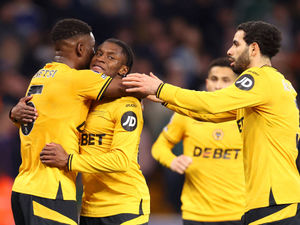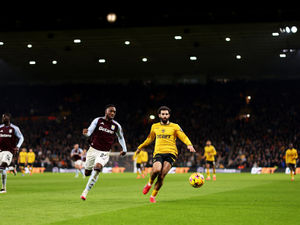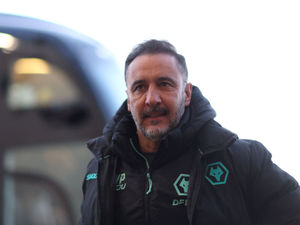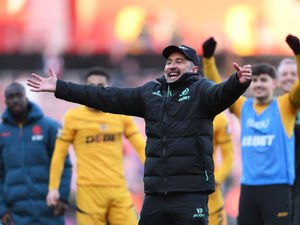Mike Bailey reveals his one Wolves regret
"It was a team with personality, a flamboyant team. They were really good days."
And Mike Bailey should know. Captain of a swashbuckling 1970s Wolves team held in as fond a regard as the all-conquering team of the 1950s, Bailey experienced far more highs than lows during his 10 years at Molineux.
He began by leading the team to promotion from the Second Division in 1966/67, missing just one game, then helping them to top-flight positions of fourth and fifth in 1971 and 1973, getting to the final of the UEFA Cup in between, and then of course lifting the League Cup at Wembley in 1974.
During a glittering career, the archetypal skipper won two England caps and also had a successful (if brief) foray into management, leading Brighton to their highest-ever league position at the time of 13th in the First Division, in 1982.
Bailey has been reflecting a lot on all this of late, having delved into his past for a new book about his life, The Valley Wanderer.
And yet it could all have been so different. In 1965 while playing for Charlton, Bailey broke his leg. It came just a few months after he had won the second of his England caps, and in those days there was no guarantee his career wouldn't be over.
"I'd been in the England team the year before," Bailey, who now lives in Surrey, said.
"The first one was against America. I'd just come back from the under-23s, apparently there was an injury, so when I came back they said they need me to go to America.
"We won 10-0, which was very easy, and Ron Flowers was captain.
"My second one was at Wembley against Wales (in November 1964) and it was fantastic. The only shame was I had to swap shirts at the end – I really didn't want to!
"And then I broke my leg. It was seven minutes into an FA Cup came at Middlesbrough. I let the ball run, played it to the right, and bang. Before I knew it I was in the hospital, which was next door.

"Barbara (Mike's wife) put the TV on to see what the result was. They said 'Bailey's been carried off with a fractured leg'. So she went to Euston and got the night train to come and see me. It was a bit different in those days.
"I was worried that may have been it. In the end I was out for six months, my leg got stronger and I never had problems with it again, so it was a blessing in disguise in that respect.
"Charlton had these terraces, I'd go up to them every day, I was getting fitter and fitter. But it was too late to get in the 1966 World Cup side – Alf Ramsey had got his team in place."
Soon came the Wolves call. Bailey roomed with Ernie Hunt for the England Under-23s, who helped persuade him to make the move north, from one Second Division club to another.
Not that Bailey felt like he had a choice.
"I signed so quickly, you wouldn't believe it.
"I went up to Wolverhampton, spoke to John Ireland, and said I'd like to have a chat with my wife and think about it.
"He said, 'oh no you mustn't do that, you must sign for us now'.
"I got back to Charlton and the manager asked what happened. I said I'd signed. He said Spurs and Nottingham Forest want to see you as well!
"It wasn't a problem at all, I knew I'd be okay with Ernie and (manager) Ronnie Allen."
A big attraction was the lure of helping restore Wolves to the heights they had achieved just a few years earlier.
Bailey used to listen to the famous floodlit games of the 1950s on the wireless, and Wolves were still regarded as one of the country's biggest clubs. Success soon returned. As did those European nights, including a trip to face Italian giants Juventus, when they took along a bona fide Old Lady legend.
"I was injured for that game but went along with the squad," Bailey said.
"The manager got John Charles to come with us and be our interpreter. I walked over with him before kick-off.
"Well to start with he got off the coach and his old Juventus boot man got down on his hands and knees and kissed his feet. I just couldn't believe it.
"Then as soon as he got on to the field the whole stadium stood up, chanting his name.
"That European run was a real highlight for all of us. And then to get Spurs in the final was such an anti-climax."
Two years later came Bailey's crowning glory in a Wolves shirt.
Despite being huge underdogs, they beat Manchester City 2-1 at Wembley to win the League Cup, a game and a winning goal in which Bailey played such a key role, starting the move for John Richards' winner.
"I've never seen Derek Parkin tackle someone so hard," Bailey said of the match. "John McAlle was the outstanding player in our side that day.
"To get to Wembley and win a cup – and of course to be captain – it was incredible.
"After the dinner in the evening everybody was going to bed, and they'd left the cup on the table.
"So I took it into our bedroom, we took it back to Wolves and the next day (Mike and Barbara's son) Andrew took it to his school in Codsall.
"Meanwhile I went into training and everyone said, we've lost the cup. I said no, I've got it! They were heady days for me and for Wolves.
"The team didn't change much, that's why I think we did so well.
"The captain thing, I've no idea how I did that. I got the role because I talked too much.
"It just felt natural to me to talk and help the players, I loved it, and I was in a position to get everywhere on the field if I had to. It was a natural thing for me.
"But we had a great squad of players, of characters.
"It was a great dressing room to be in. When Ronnie Allen was there we'd just play cricket in the dressing room before we went out. I remember Knowlesy (Peter Knowles) comes and whacks one, he nearly broke a window. They were a great bunch of lads to be around."
When Sammy Chung took over as manager in 1976, suddenly Bailey's face didn't fit anymore. Kenny Hibbitt was made captain and Bailey was moved to centre-half.
He soon left Wolves, with a heavy heart, but some wonderful memories.
A career in management for the natural leader of men beckoned.
He was pretty good at it too – leading Charlton to promotion, enjoying success with Brighton – and very nearly returning to his beloved Wolves.
Why, then, was his management career all but over in the early 1980s?
"Well, the management thing, I never really got used to. I think the reason is because I couldn't do anything – I was on the sidelines. I couldn't get out there. I just didn't feel I was in control.
"The stress got to me a bit as well, I was almost ill after the games.
"Iwas interviewed by Derek Dougan and others for the Wolves job in 1984 (after Graham Hawkins left), but Tommy Docherty got it instead.
"I would have loved to have done it. John Ireland later said it was his dream for me to be the manager, but the regime had changed with Harry Marshall coming in a few years earlier, so it never happened.
"It was a shame – it was on my wish list."
For a man whose passion, determination and drive took him to the very top of the sport, one of very few regrets.





